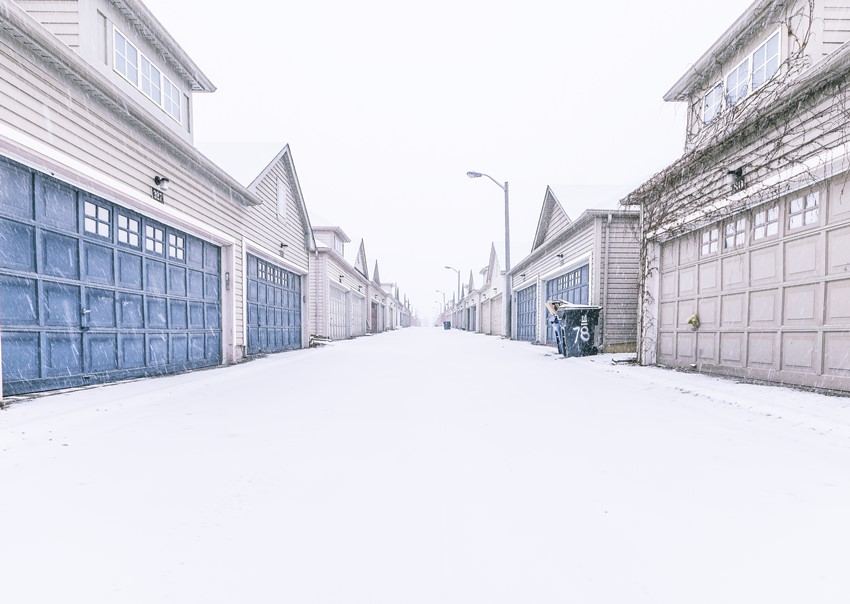The Effects of the Cold on Garage Door Springs

People think of their garage door as being a pretty resilient mechanism. And it is. But there are many components to the modern automatic garage door and the different components tend to react differently to things like the weather. The tracks the garage door rides up and down in, for instance, are not usually affected by cold weather - but torsion and extension springs are.
The Purpose of Garage Door Springs
Garage door springs are heavy and strong, so it surprises people that they are often one of the first things to give out on a garage door. But there are a couple of good reasons why that happens. First, garage door springs are under constant stress from the moment they’re installed. In fact, the only time they get a break is when your door is fully open. Then, and only then, there is no tension in the spring and it can relax. As soon as the door is lowered again, energy is absorbed by the spring and the spring stays ‘loaded’ until that energy is released to open the door at a later time.
The Carbon Connection
Having to constantly fight back against the energy it absorbs when the door closes causes what's known as 'metal fatigue' in the spring. This leads us to the second reason springs give out: cold weather. Metal fatigue is exacerbated by cold weather which causes the springs to become brittle, especially if the steel used to make the springs contains a lot of carbon. And there’s the rub. Because high carbon steel typically is necessary to produce high-quality springs. So the same material that's necessary to make the garage door springs also causes them to become brittle when the temperature drops. Eventually, the spring snaps and you need to call for professional garage door services.
Ways to Prevent Cold Weather Damage to Garage Door Springs
Your garage door springs have two fundamental enemies: stress and cold. While there is no way to completely negate the effects of these, there are methods you can use to reduce their impact over time.
Method 1: Keep the Garage As Warm As Possible
A well-insulated garage door will raise your garage's temperature. The warmer your garage, the better it is for the springs. But insulation is just one part of the equation. You also have to make sure you keep the door closed as much as possible during the winter, as that allows the garage to retain as much heat as possible. So always close the door as quickly as possible during cold weather.
Another way to fend off cold weather damage to your springs is to keep them properly lubricated. This is true whether your door uses torsion or extension springs. A good lubricant is absorbed by the spring helping to prevent it from becoming brittle when the temperature drops. Also, during the winter months, the environment in the garage can become very damp, causing the springs to rust. That is another threat to the longevity of the springs. Keeping the springs lubricated can prevent rust from forming.
Method 2: Relieve Stress on the Springs
Keeping the springs as warm as possible is only one part of getting the most out of them. The other part is reducing stress on them. The best way to do that is to keep the garage door open. Because, as we discussed above, that is the only time when the springs are able to relax.
Unfortunately, opportunities to keep the door open for extended periods don’t come around very often during the winter. So this is something that will mostly be done once the weather warms up. Still, you should stay alert for opportunities. If you have a run of unseasonably warm weather in January or February, open the door for a few hours each day. As long as you can do so without compromising home security.
When to Call for Garage Door Services
You may buy a couple of extra years for your springs by following the advice we laid out above. But inevitably, regardless of how well you take care of your garage door springs in Broomfield, they will snap. There’s no way around it. When that happens we would strongly urge you to resist the urge to replace the spring or springs yourself. More than a few people have died working on or around garage door springs. So, if your garage door springs have reached the end of the road, call the pros at A Better Garage Door. We’ll have someone there in a jiffy to replace broken springs safely and correctly so you can resume your busy lifestyle with minimal interruption.
The Bottom Line
Garage door springs are tough customers, but they are not indestructible. Everyday wear and tear along with cold weather take a toll on them. Fortunately, there are things you can do to ward off some of the damage from extremely cold weather. Keeping your garage as warm as possible is one. Hiring one of our experienced garage door service technicians to lubricate the springs regularly is another. And remember, if a garage door spring should break, DO NOT try and repair it yourself. Instead, give A Better Garage Door a call and leave this dangerous work to the professionals. You’ll be glad you did.
Read our additional blog content for more information on the risks of DIY garage door repairs.